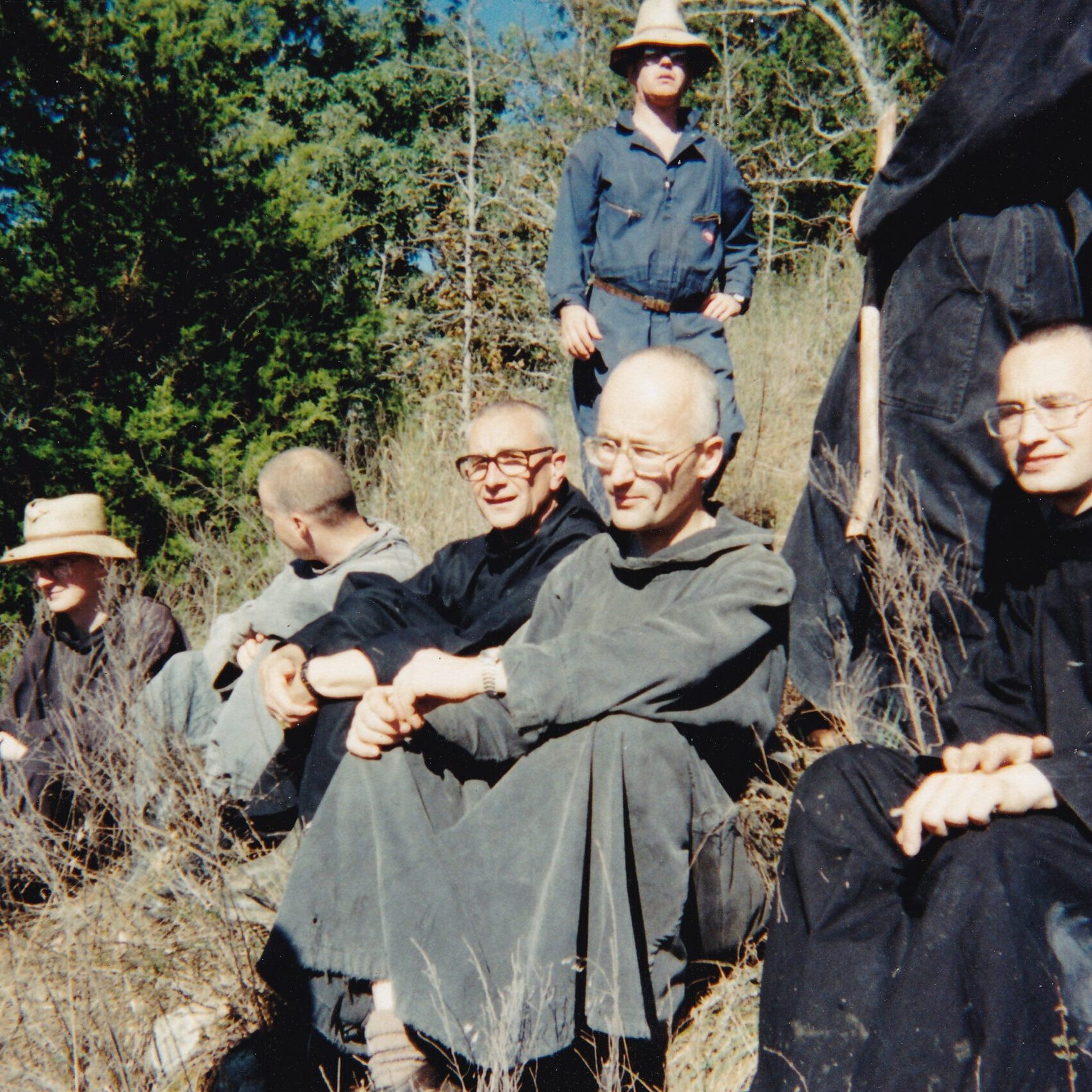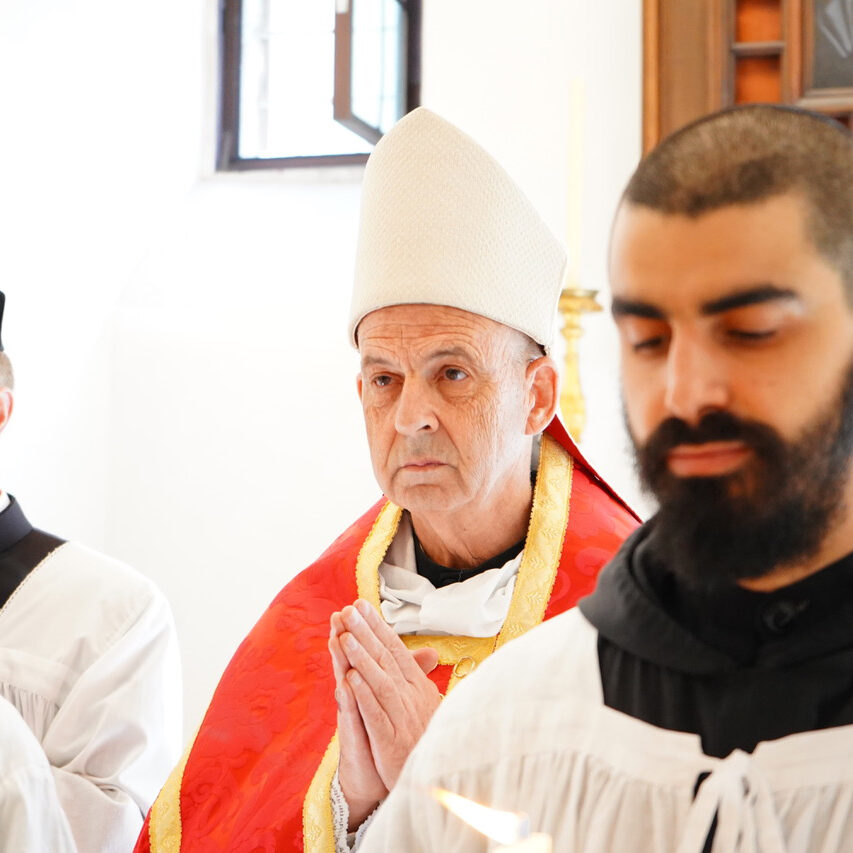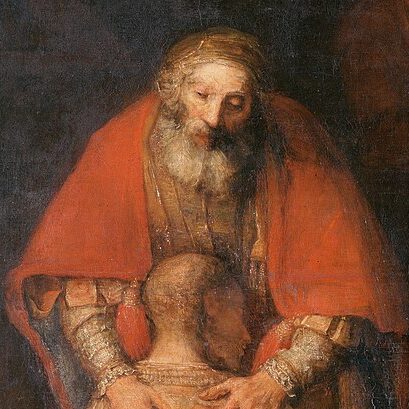Dear Friend of Clear Creek Abbey,
In the mystery and poetry of Christmas there is an awareness of a catastrophe that has upset creation, a kind of ancestral memory of a certain garden and the sad burden of sin that weighs upon the world.
The Child of Bethlehem, Emmanuel, is coming to set things right. Lying between the ox and the donkey in the stable, He rules from his crib the stars, the winds and the tides, and so has power to usher in a renewed order. This new creation will not come without a struggle, but that is another story…
And to Adam [God] said: Because thou hast harkened to the voice of thy wife, and hast eaten of the tree, whereof I commanded thee that thou shouldst not eat, cursed is the earth in thy work; with labour and toil shalt thou eat thereof all the days of thy life (Gen. 3:17).
What has Man done with the world entrusted unto his hands? We are familiar with that variety of political discourse that uses these issues related to God’s creation as a pretext for promoting its own self-serving agenda. But there is also the plain fact that in our day mankind increasingly finds itself living in an artificial wasteland, a new kind of desert, one that seems to produce less and less of anything that grows naturally—excepting, perhaps, cancer.
Monasteries, where Christmas is celebrated not as a season for shopping, but as a celebration of the God- Man, who has come to earth in order to restore all things, monasteries have a role to play in helping Man back to the garden of innocence—or to something even better.
“Are not,” asks Pope Benedict XVI in his book entitled Jesus of Nazareth (Vol. 1, Ch. 2, p. 28), “the oases of creation that sprang up, say, around the Benedictine monasteries in the West foreshadowings of this reconciliation of creation brought about by the children of God—just as, conversely, something like Chernobyl is a shocking expression of creation’s enslavement in the darkness of God’s absence?”
As I look back upon the Year of Our Lord 2014, the reasons for giving thanks to God are many. We are thankful for a “bushel basket” of new postulants, four of which were given the monastic habit on October 28th; we thank God for two new priests and a new deacon; we are thankful for several professions, both of simple and of solemn vows; we look with awe at the way our grounds and buildings are taking on a new beauty as monastic work transforms them little by little. It would require too long a list in order to detail all the benefits Divine Providence has showered upon us. What more can I say?
We do very much want to be that “oasis of creation,” that place of “reconciliation of creation,” Pope Benedict speaks of, where both monks and the men and women of our time can find rest from the trials of the desert of the world. We want the Abbey to be the place where the solemn voice of the Church-Bride celebrating her Bridegroom at the Divine Office is heard. We also want it be at the center of a true Catholic village, one where the poisoned carols of the Antichrist are heard no more in the land, but where the authentic sounds of Christmas fill hearts with gladness—especially those of the many children.
On behalf of all the monks, I thank you for being a part of the story of Clear Creek, one that will continue, by the grace of God, for a thousand Christmases—or until the last trumpet.
+ br. Philip Anderson, abbot
Dear Friend of Clear Creek Abbey,
In the mystery and poetry of Christmas there is an awareness of a catastrophe that has upset creation, a kind of ancestral memory of a certain garden and the sad burden of sin that weighs upon the world.
The Child of Bethlehem, Emmanuel, is coming to set things right. Lying between the ox and the donkey in the stable, He rules from his crib the stars, the winds and the tides, and so has power to usher in a renewed order. This new creation will not come without a struggle, but that is another story…
And to Adam [God] said: Because thou hast harkened to the voice of thy wife, and hast eaten of the tree, whereof I commanded thee that thou shouldst not eat, cursed is the earth in thy work; with labour and toil shalt thou eat thereof all the days of thy life (Gen. 3:17).
What has Man done with the world entrusted unto his hands? We are familiar with that variety of political discourse that uses these issues related to God’s creation as a pretext for promoting its own self-serving agenda. But there is also the plain fact that in our day mankind increasingly finds itself living in an artificial wasteland, a new kind of desert, one that seems to produce less and less of anything that grows naturally—excepting, perhaps, cancer.
Monasteries, where Christmas is celebrated not as a season for shopping, but as a celebration of the God- Man, who has come to earth in order to restore all things, monasteries have a role to play in helping Man back to the garden of innocence—or to something even better.
“Are not,” asks Pope Benedict XVI in his book entitled Jesus of Nazareth (Vol. 1, Ch. 2, p. 28), “the oases of creation that sprang up, say, around the Benedictine monasteries in the West foreshadowings of this reconciliation of creation brought about by the children of God—just as, conversely, something like Chernobyl is a shocking expression of creation’s enslavement in the darkness of God’s absence?”
As I look back upon the Year of Our Lord 2014, the reasons for giving thanks to God are many. We are thankful for a “bushel basket” of new postulants, four of which were given the monastic habit on October 28th; we thank God for two new priests and a new deacon; we are thankful for several professions, both of simple and of solemn vows; we look with awe at the way our grounds and buildings are taking on a new beauty as monastic work transforms them little by little. It would require too long a list in order to detail all the benefits Divine Providence has showered upon us. What more can I say?
We do very much want to be that “oasis of creation,” that place of “reconciliation of creation,” Pope Benedict speaks of, where both monks and the men and women of our time can find rest from the trials of the desert of the world. We want the Abbey to be the place where the solemn voice of the Church-Bride celebrating her Bridegroom at the Divine Office is heard. We also want it be at the center of a true Catholic village, one where the poisoned carols of the Antichrist are heard no more in the land, but where the authentic sounds of Christmas fill hearts with gladness—especially those of the many children.
On behalf of all the monks, I thank you for being a part of the story of Clear Creek, one that will continue, by the grace of God, for a thousand Christmases—or until the last trumpet.
+ br. Philip Anderson, abbot






